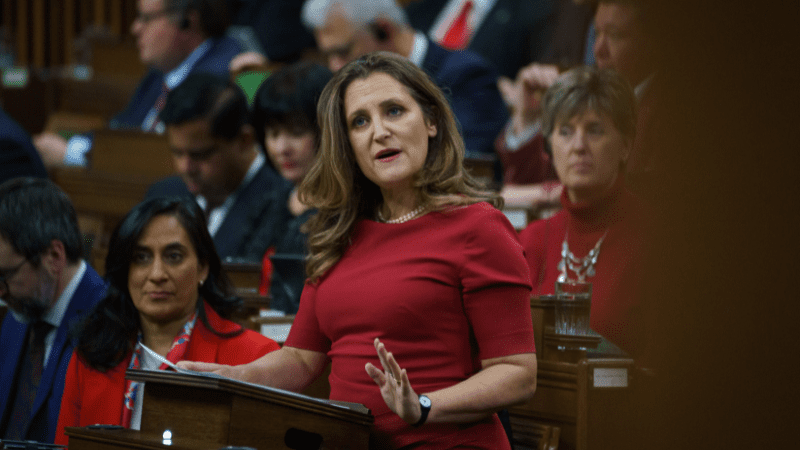By Aaron Wudrick, January 31, 2024
With the return of Parliament this week, the legislative process springs back to life — and one major bill on the docket is Bill C-59, an omnibus initiative that implements various measures related to the spring federal budget and fall economic statement.
Notably, Bill C-59 contains further proposed changes to competition law, an area under which the Liberal government has been under pressure to address a lack of competition in areas as wide-ranging as groceries and telecoms.
In December, the government passed Bill C-56, which made significant changes to existing competition law under the guise of improving competition but which may end up making things worse. Unfortunately, when it comes to competition law, Bill C-59 may suffer from the same problem: damaging unintended consequences from two proposed changes relating to merger review and the right of private action.
In Canadian competition law, merger review refers to the process by which the Competition Bureau assesses the potential impact of proposed mergers, acquisitions or other business transactions on competition within the Canadian marketplace. The merger review process is governed by the Competition Act, which is the primary legislation regulating competition matters in Canada.
When businesses plan to merge or engage in transactions that may substantially prevent or lessen competition in Canada, they are required to notify the commissioner of competition, who heads the Competition Bureau. The commissioner assesses whether the proposed transaction would likely result in a substantial lessening of competition. In rare cases where the bureau cannot resolve a dispute, it may file an application to the Competition Tribunal for a ruling — most recently in the case of the Rogers-Shaw merger.
The primary goal of merger review in Canadian competition law is to maintain and promote competitive markets, ensuring that consumers benefit from choices, innovation and fair pricing. The process is designed to prevent anticompetitive behaviour and protect the competitive landscape in Canada.
If passed, Bill C-59 would repeal the section of the Competition Act that prohibits the Competition Tribunal from concluding that a merger is anticompetitive based on market share alone. This may sound superficially appealing — market share is indeed a factor in competitiveness in a given industry — but the problem is that treating it as the determinative factor is a mistake.
Removing this prohibition will have the effect of empowering courts to develop an analytical framework that includes structural presumptions based on market share and put an onus on merging parties to prove a negative — namely, a lack of anticompetitive effects.
Even more unfairly, the Competition Bureau has significant information-gathering powers when reviewing mergers. For example, it can compel oral testimony under oath and obtain search warrants to obtain records from third parties.
But merging parties do not have any such powers. Putting the onus on the merging parties to prove a lack of anticompetitive effect when they do not have the power to compel information from third parties (or even the ability to lawfully review competitively sensitive information from such parties) is manifestly unfair.
The news is no better concerning C-59’s expansion of the right of private action under the act, which refers to the legal authority granted to private parties (individuals or businesses) to bring a legal action against others for alleged violations of competition laws. The right of private action allows individuals or companies that have suffered harm due to anticompetitive conduct to seek damages or other remedies through the legal system.
On the one hand, an expanded private right of action enhances the enforcement mechanisms under Canadian competition law by allowing those directly affected by anticompetitive conduct to seek compensation. However, the language in C-59 arguably goes much further than this, establishing a mechanism akin to the claims process used for class action proceedings — but without the important procedural protections and requirements in place governing class action proceedings in Canada.
This could lead to a scenario where a claim could be advanced before the tribunal on behalf of hundreds of thousands of “potentially” affected persons without an early assessment of whether these persons have a reasonable and similar cause of action, and even whether the tribunal is the appropriate forum for the proceedings. In other words, it has the potential to become a cash cow for plaintiff lawyers without any benefit to consumers.
Having guardrails is also essential to ensure the tribunal doesn’t get bogged down with frivolous claims that waste significant resources that instead could be used to address bona fide harmful conduct. It would also help businesses that compete aggressively but in good faith to avoid costly, onerous and strategic litigation.
At the very least, C-59 should be amended to empower the tribunal to enforce the guardrails already central to the administration of Canadian intended class proceedings in other areas of law. This would balance the interests of affected consumers while ensuring that frivolous applications are rejected.
There’s no question that many sectors in Canada could use more competition, so it’s a shame the Trudeau government has spent so much time and energy on legislation that tries to wrongfoot businesses based on market share, rather than addressing the real problem: barriers to entry put in place by the government itself.
Aaron Wudrick is the director of the domestic policy program at the Macdonald-Laurier Institute






